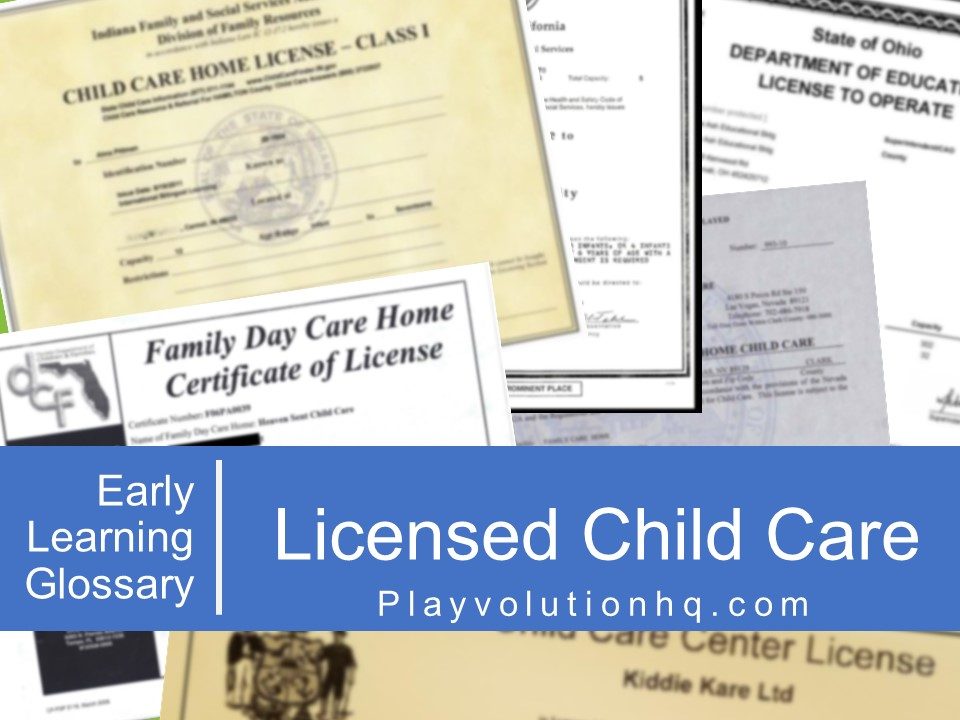
Table of Contents
Licensed Child Care Overview
The term licensed child care refers to a program that participates in a licensing process through a regulatory entity, such as a state Department of Education or Child Welfare. While licensing is mandatory for child care programs in many areas, it is a voluntary process in others. In some jurisdictions, only child care settings that serve a certain minimum number of children must become licensed. Licensed child care standards vary from jurisdiction to jurisdiction, but standards tend to focus on:
- Adult-child ratios for different age groups and class size
- Child supervision
- Health and safety
- Programming
- Nutrition and meal service standards
- Staff training, health, and employment requirements.
Licensed child care programs must provide a fair amount of documentation to the responsible oversight agency. They also generally have to submit to regular onsite visits from an agency representative. Inspection visits from other agencies may also be part of the licensure process. For example, in some areas visits from fire inspectors and health department representatives are part of the process.
Not all regulated child care requires licensure, some programs are exempt from licensing. For example, programs serving small numbers of children may be required to perform staff background checks, meet essential health and safety standards, and obtain a certain number of in-service training hours for staff. The standards for regulated child care programs are generally not as stringent as for licensed programs. Other types of programs, like kith-and-kin care, are usually exempt from licensure and unregulated.
A License Does Not Mean Quality
Parents shouldn’t assume their child care is quality because it has a license on the wall. Simple licensure does not mean a child care program offers a quality service. It simply means the program has met minimum standards. According to uslegal.com, “The responsible agency develops minimum standards for regulated facilities and homes as well as policies and procedures for enforcing those minimum standards.”
Having a valid child care license also does not mean the program always meets those minimum standards. Sadly, too many licensed programs let their adherence to standards slip. While technically licensed, they don’t meet those minimum standards on a daily basis.
Add Stress And Frustration
It should also be noted staff at some early learning programs believe the licensing process adds a layer of bureaucracy, stress, and frustration that lowers their program’s quality. This stems from unclear and arbitrarily enforced regulations, licensing staff with limited understanding of child development, and a general Us versus Them relationship with the agency. Anecdotally, in training sessions about caregiver stress and burnout over the last two decades, I’ve repeatedly heard stories from early learning professionals highlighting how conflicts with licensing agencies drive up stress and reduce job satisfaction.
Licensed Child Care Wrap-Up
In the final analysis, child care licensing programs are imperfect systems with the good intention of providing a minimum level of care for children in their jurisdictions. While plenty of dedicated and well-trained people work at all levels of licensing agencies, they also have their share of warm bodies unqualified for the work. Many of these agencies also suffer from big workloads, small budgets, and mandates made by elected officials who may lack understanding of the on-the-ground realities of child care.
Contribute content to Playvolution HQ
Brought to you by Explorations Early Learning
Thoughts On This Entry?
I’d love to hear your thoughts on improving this entry and suggestions for additional glossary additions in the comments below. You can also contact me with comments or concerns.
Browse Trainings
Post Author
Jeff Johnson is an early learning trainer, podcaster, and author who founded Explorations Early Learning, Playvolution HQ, and Play Haven.


Leave a Reply